Fantastic, the woman and the social meaning of unusual in the tale "As flores" by Augusta Faro
DOI:
https://doi.org/10.11606/issn.2316-9826.literartes.2017.115130Keywords:
Fantastic, Unusual events, Woman, Patriarchy, IdentityAbstract
The present work aims to analyze the tale “As flores” (2001) by
Augusta Faro, by which it is intended to identify the characteristics of the
fantastic genre, revealing the meanings of the unusual events and their
symbolic influence for the construction of the image of the woman in a
society marked by patriarchal precepts. The analysis is permeated by
factors that refute the hegemony of the ideology of male superiority and
consequently of marginalization and prejudice against women. The tale
presents the breakup of the protagonist, Rosa, with the long-standing
vision of the called "woman's destiny", that is, the character witnesses the
decadence of patriarchalism and its ideals of domination, reaffirming
itself as an individual and building their identity as an autonomous being.
Thus, because it is characterized as a bibliographical research, it is based
on theorists such as Todorov (2014), Bessière (2009), Sartre (2005),
Beauvoir (1970), Araújo (2010), among others.
References
ARAÚJO, Adriana Lopes de. ZOLIN, Lúcia Osana. Construção de
personagens femininas em Solidão calcinada, de Bárbara Lia. X
Seminário de Estudos Literários. São Paulo: Unesp, 2010.
BEAUVOIR, Simone de. O segundo sexo. Trad. Sérgio Milliet. Rio de Janeiro: Nova Fronteira, 1970.
BESSIÈRE, Irène. O relato fantástico: forma mista do caso e da adivinha. Trad. Biagio D’Angelo. In: Revista Fronteiraz, vol. 3, n. 3, Setembro/2009, p. 185-202.
BOURDIEU, Pierre. A dominação masculina. Trad. Helena Künher. 4. ed. Rio de Janeiro: Bertrand Brasil, 2002.
BUTLER, Judith. Problemas de gênero: feminismo e subversão da
identidade. Rio de Janeiro: Civilização Brasileira, 2003.
CHEVALIER, Jean; GHEERBRANT, Alain. Dicionário de símbolos. Trad. Vera da Costa e Silva. 24. ed. Rio de Janeiro: José Olympio, 2009.
FARO, Augusta. A friagem. São Paulo: Global, 2001.
GARCÍA, Flavio. Fantástico: a manifestação do insólito ficcional entre modo discursivo e gênero literário – literaturas comparadas de língua portuguesa em diálogo com as tradições teórica, crítica e ficcional. In: Anais do XII Congresso Internacional da ABRALIC. UFPR – Curitiba. 2011.
SARTRE, Jean Paul. Aminadab, ou o fantástico considerado como uma linguagem. Trad. Cristina Prado. In: ____ Situações I: críticas
literárias: São Paulo, Cosac Naify, 2005.
TODOROV, Tzvetan. Introdução à literatura fantástica. Trad. Maria Clara Correio Castello. Reimpr. da 4. ed. São Paulo: Perspectiva, 2014.
Downloads
Published
Issue
Section
License
Autores que publicam nesta revista concordam com os seguintes termos:
- Autores mantém os direitos autorais e concedem à revista o direito de primeira publicação, com o trabalho simultaneamente licenciado sob a Licença Creative Commons Attribution que permite o compartilhamento do trabalho com reconhecimento da autoria e publicação inicial nesta revista.
- Autores têm autorização para assumir contratos adicionais separadamente, para distribuição não-exclusiva da versão do trabalho publicada nesta revista (ex.: publicar em repositório institucional ou como capítulo de livro), com reconhecimento de autoria e publicação inicial nesta revista.
- Autores têm permissão e são estimulados a publicar e distribuir seu trabalho online (ex.: em repositórios institucionais ou na sua página pessoal) a qualquer ponto antes ou durante o processo editorial, já que isso pode gerar alterações produtivas, bem como aumentar o impacto e a citação do trabalho publicado (Veja O Efeito do Acesso Livre).



